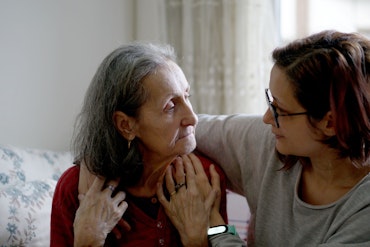Palliative care program changing how we ‘die’
More than three-quarters of people referred to a new community palliative care service in New South Wales have fulfilled their wish of dying at home, according to figures released last week.

HammondCare’s lead palliative care academic, Professor Rod MacLeod.
The figures, released by HammondCare to coincide with National Palliative Care Week (24-29 May), show that since the program began in late 2013 in seven Local Health Districts in NSW, the Palliative Care Home Support program has been accessed by more than 400 people with 76% dying at home.
In comparison, Palliative Care Australia research shows that while 74% of Australians would prefer to die at home, only 16% do, with the vast majority of Australians dying in hospital.
HammondAtHome general manger, Sally Yule, says this is a significant initial result when compared to statistics for the general population.
“This program is all about providing people with choice and flexibility at a critical time of their lives. It is all about the patient, their family and what is helpful to them,” Ms Yule says.
“We see that with the proper support, people are more likely to be able to die at home if they choose. Often people are scared or don’t have the confidence or knowledge to do this, and combined with a lack of access to specialist palliative care support, it means often this choice is denied,” she says.
According to Ms Yule, this is a “little talked about issue, but one that affects everyone.
“It is important for our human dignity that we have some choice and flexibility in deciding where we wish to die,” Ms Yule says.
HammondCare’s lead palliative care academic, Professor Rod MacLeod, says after devoting 25 years of his career to palliative care, his past year’s work with the Palliative Care Home Support program was “perhaps the most significant.”
“This is proving to be an innovative, ground-breaking program that’s making an enormous difference in the lives of many families,” Professor MacLeod says.
“The figure of 76% is a stunning result so soon. Instead of the clinical and often intimidating atmosphere of hospital – people are being given the choice of dying with, as I put it, ‘The wind in their hair and the sun on their back.’
“Palliative care is and always has been about ‘dying with dignity’ – enabling people to spend their final days in as much comfort and care as we can physically offer. Now, more and more this can happen in the place of their choice,” Professor MacLeod says.
HammondCare operates the service in a consortium with Sacred Heart Health Service and Calvary Health Care Sydney. The Palliative Care Home Support Program is funded by the NSW Ministry of Health and is a key initiative under the state government’s $35 million commitment to increase access to community based palliative care.

Palliative Care Australia's (PCA) theme for National Palliative Care Week is Dying to talk: Talking about dying won’t kill you.























